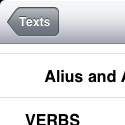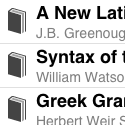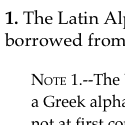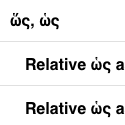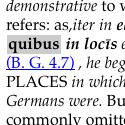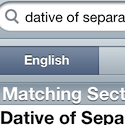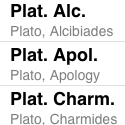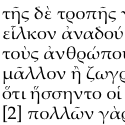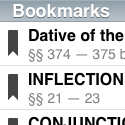Download Grammaticus now!
Grammaticus brings three indispensable reference works for any scholar of the classics—Smyth's Greek Grammar, Allen and Greenough's New Latin Grammar, and Goodwin's Syntax of the Moods and Tenses of the Greek Verb, as seen on the Perseus Digital Library—to your iPhone and iPad. With Grammaticus, the wisdom of the ancients is yours to command.
It's dangerous to go alone! Take this.
Every scholar of the classical world knows how invaluable Smyth's Greek Grammar and Allen and Greenough's New Latin Grammar are for the study of the most beloved Greek and Latin texts. (Goodwin's work, while perhaps not as well-known, contains a wealth of useful information on the intricacies of the Greek verb.) Grammaticus combines the full texts of these works with the power and convenience of the iPhone and iPad, giving you the tools to make your grammatical sleuthing effortless and perhaps even enjoyable!
With Grammaticus on your iPhone, you no longer have to choose between reading your favorite bucolic poetry under the cover of a broad beech tree and having access to a comprehensive grammar. When you have Smyth and A&G readily available no matter where you go, you'll be surprised at how often you end up consulting them! Similarly, Grammaticus on an iPad turns the task of poring over these occasionally-prolix tomes into a near-luxurious experience.
Grammaticus lets you browse the table of contents for each work and follow hyperlinks between sections to find what you're looking for quickly and easily. Or, if you're reading a commentary that prides itself on its high value of Smyth-references-per-page, you can view a specific section at the drop of a hat.
Full-text search
Grammaticus includes speedy
full-text search
in English, Greek and Latin. Got a burning question about gerunds? Search for gerund
to see all sections with gerund
in the title and all instances of the word in the entire text. If that's not enough, Grammaticus lets you search for
multiple terms
(so you can find all the sections that discuss spurious diphthongs or the accusative absolute) and terms
starting or ending with a substring
(so you can find every Latin word that begins with
fac-
or every Greek word that ends in -ονται).
Citation search and retrieval
It's a familiar story: you're trying to puzzle out a tricky sentence from Thucydides, and you're sure it must
be cited
somewhere
in Smyth, but you don't have the slightest idea of where to look. Have no fear! With Grammaticus, you can search for cited passages
using the standard scholarly abbreviations, like
Thuc. 2
for Book II of Thucydides orAesch.
for all of the tragedies of Aeschylus. If you don't know all the abbreviations offhand, don't worry—Grammaticus suggests completions for you as you type based on the authors cited in whichever grammar you're looking at. And if a quoted passage intrigues you, a single tap is all you need to
view the passage in its original context, as it appears on Perseus.
Bookmarks and history
Do you find yourself repeatedly confounded by the plethora of Greek names in Latin epic and their unpredictable case endings? Or maybe you only use Smyth to look up odd forms of μι-verbs. Not a problem: Grammaticus lets you bookmark your favorite sections in each text so that they're just a tap away. And it keeps a history of the sections you've visited, so that, like a modern-day Theseus, you can fearlessly make your way through a tangled maze of references and hyperlinks, knowing you'll be able to jump right back to where you came from.
Drudgery's kiss of death
The rewards of reading the classics in the original language are undeniable. But navigating your way through any author—to say nothing of a particularly gnarly chapter of Tacitus or a choral passage of Aeschylus—can be a daunting experience. Sometimes, sinister grammatical constructions and inexplicable archaic forms seem to lurk around every bend, with no goal save to befuddle the unsuspecting reader. But with Grammaticus on your side, there's no need to be afraid. Whether you want to check a single perplexing use of the ablative or the commentary you're reading is dispensing enough Smyth references to blot out the sun, you'll be ready.
Grammaticus—with apologies to the greatest historian of all time—is truly a modern-day κτῆμα ἐς αἴει and an invaluable aid for every classical scholar. Download it now and see for yourself!
